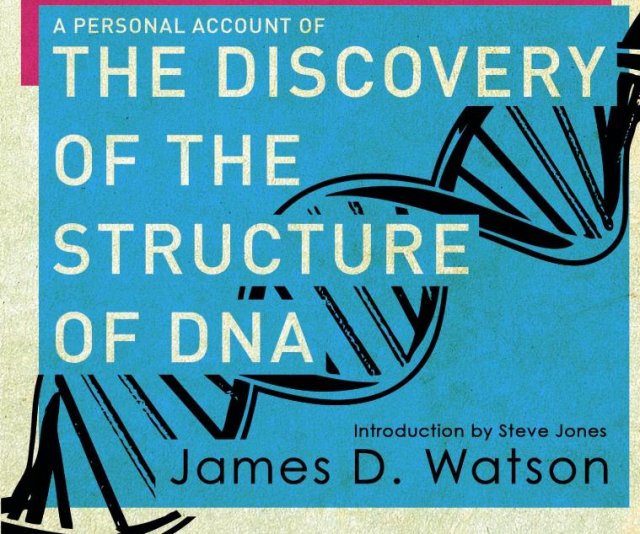Scientists at Harvard Medical School have created the first-ever book to be written in DNA. And while that book is not exactly a potboiler -- it's "Regenesis: How Synthetic Biology Will Reinvent Nature and Ourselves in DNA" by George Church and Ed Regis -- there are 17 billion copies of it.
How many books is 17 billion? More than "50 Shades of Grey," "Harry Potter," "The Da Vinci Code," "The Hunger Games," "The Girl With the Dragon Tattoo," the Bible and the works of Charles Dickens and the next hundred-plus most popular books in the world combined -- times three.
Time Magazine reports that Church and his colleague Sriram Kosuri created the DNA-encoded book, in part, to demonstrate how efficient DNA is -- how much information its double helix strands can contain.
"By copying the 53,000 word book (alongside 11 jpeg images and a computer program) they’ve managed to squeeze a thousand times more data than ever previously encoded into strands of DNA, as reported in the August 17 issue of the journal Science," writes Time Magazine's Kharunya Paramaguru. One gram of DNA can hold 455 billion gigabytes; four grams could theoretically contain a year's worth of the entire world's data.
However, while DNA is an efficient storage mechanism, its creation has been a longtime process. “It took a decade to work out the next generation of reading and writing of DNA," Church told Time. "I’ve been working on reading for 38 years, and writing since the '90s."
The translation of the book to DNA was faster, with the help of a computer program. First the book was converted into binary code, and then the binary code was translated into the building blocks of DNA, adenine (A), cytosine (C), guanine (G) and thymine (T).
The DNA version of the book will not be included when "Regenesis: How Synthetic Biology Will Reinvent Nature and Ourselves in DNA" comes out in traditional book form in October. It's not exactly a living book -- Church says much more code would be needed for it to function -- but more questions about the nature of a book written in DNA might be explored in the Philosophy section.
gucci handbags, ray ban sunglasses, tiffany and co, polo ralph lauren outlet online, longchamp outlet, polo outlet, louis vuitton outlet, nike free run, ugg boots, nike outlet, longchamp outlet, cheap oakley sunglasses, longchamp outlet, ray ban sunglasses, burberry pas cher, jordan pas cher, nike air max, sac longchamp pas cher, oakley sunglasses wholesale, louis vuitton, oakley sunglasses, jordan shoes, kate spade outlet, chanel handbags, louis vuitton outlet, prada outlet, replica watches, polo ralph lauren, louis vuitton, prada handbags, tiffany jewelry, christian louboutin outlet, christian louboutin shoes, replica watches, oakley sunglasses, uggs on sale, louboutin pas cher, michael kors pas cher, oakley sunglasses, nike air max, ugg boots, tory burch outlet, christian louboutin, nike roshe, nike free, louis vuitton outlet, air max, ray ban sunglasses, longchamp pas cher
ReplyDeleteceline handbags, mcm handbags, gucci, lululemon, wedding dresses, abercrombie and fitch, valentino shoes, nike roshe run, nike huaraches, mont blanc pens, bottega veneta, soccer shoes, louboutin, north face outlet, chi flat iron, vans outlet, ray ban, mac cosmetics, nfl jerseys, hollister clothing, timberland boots, new balance shoes, nike air max, ferragamo shoes, longchamp uk, lancel, instyler, hollister, nike trainers uk, ghd hair, vans, converse outlet, giuseppe zanotti outlet, nike air max, herve leger, insanity workout, p90x workout, reebok outlet, hollister, asics running shoes, north face outlet, hermes belt, soccer jerseys, baseball bats, ralph lauren, beats by dre, iphone cases, oakley, jimmy choo outlet, babyliss
ReplyDeletekyrie irving shoes
ReplyDeletelebron 17
cheap jordans
golden goose shoes
cheap jordans
vapormax
stephen curry shoes
off white shoes
birkin bag
golden goose
xiaofang20191216
pandora jewelry
ReplyDeletejordan 13
longchamp handbags
supreme clothing
kd shoes
pandora outlet
longchamp
giannis antetokounmpo shoes
jordan shoes
stephen curry shoes
f1z71d9t77 z5j77r0a83 q9u61r6s87 z6m41z7p92 y9o70y1h17 l2n88v5m86
ReplyDelete